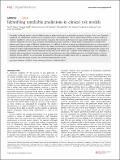Identifying unreliable predictions in clinical risk models
Author(s)
Myers, Paul D; Ng, Kenney; Severson, Kristen; Kartoun, Uri; Dai, Wangzhi; Huang, Wei; Anderson, Frederick A; Stultz, Collin M; ... Show more Show less
DownloadPublished version (1.379Mb)
Publisher with Creative Commons License
Publisher with Creative Commons License
Creative Commons Attribution
Terms of use
Metadata
Show full item recordAbstract
© 2020, The Author(s). The ability to identify patients who are likely to have an adverse outcome is an essential component of good clinical care. Therefore, predictive risk stratification models play an important role in clinical decision making. Determining whether a given predictive model is suitable for clinical use usually involves evaluating the model’s performance on large patient datasets using standard statistical measures of success (e.g., accuracy, discriminatory ability). However, as these metrics correspond to averages over patients who have a range of different characteristics, it is difficult to discern whether an individual prediction on a given patient should be trusted using these measures alone. In this paper, we introduce a new method for identifying patient subgroups where a predictive model is expected to be poor, thereby highlighting when a given prediction is misleading and should not be trusted. The resulting “unreliability score” can be computed for any clinical risk model and is suitable in the setting of large class imbalance, a situation often encountered in healthcare settings. Using data from more than 40,000 patients in the Global Registry of Acute Coronary Events (GRACE), we demonstrate that patients with high unreliability scores form a subgroup in which the predictive model has both decreased accuracy and decreased discriminatory ability.
Date issued
2020Department
Massachusetts Institute of Technology. Department of Electrical Engineering and Computer Science; Massachusetts Institute of Technology. Research Laboratory of Electronics; Massachusetts Institute of Technology. Institute for Medical Engineering & ScienceJournal
npj Digital Medicine
Publisher
Springer Science and Business Media LLC